- Home
- Mitch Albom
Finding Chika Page 2
Finding Chika Read online
Page 2
To be honest, Chika, for my first few years, I didn’t understand a great deal about Haiti, or the orphanage, or how I was supposed to make the place work. The power would go off every day, the water would run out, deliveries of rice and bulgur would start and stop, and we never had enough medicine. Repair people would say they were on their way, then never show up. Paperwork—from receipts to government documents—was done by hand. I was a writer by trade, living in Detroit, and while I had overseen some charitable operations in America, in Haiti, I often felt like a man trying to read assembly instructions in another language.
On top of that, Miss Janine and I had no children of our own. So despite my enthusiasm, I was inexperienced with parental things. I fumbled with tiny zippers and buttons. I overreacted when a child threw up. I stumbled through explaining puberty to our boys.
But I knew this: when children were brought to our gate, I had to look past their appearances, because there were so many, and so much need, and for every child we could say yes to, even now, there are ten to whom we cannot. The majority of Haitians live on less than two dollars a day, and many have no power, no clean water, and must rely on charcoal for cooking. For every thousand babies born, eighty will die before their fifth birthday.
Keeping children safe and fed is a desperate priority for many Haitians, Chika. A place like ours can offer that hope. Perhaps that’s why so many come. And when they do I must ask questions. Such as, how are the children living? How are they eating? What dire conditions have brought them to us?
You should know that when I ask such things, the adult will sometimes burst into tears. One mother in her early twenties came to us so pregnant I thought she might give birth in the office. She had a son, maybe four years old, standing beside her, and an infant in her arms. She begged us to take them both, because she had no money, no job, no home, no food to feed them. When I asked how she would provide for the baby she was carrying, she cried out, “Ou mèt pran li tou,” you can have it as well.
She was not being heartless. I believe that she loved her children—so much so that she wanted a safer life for them, even if it meant she could no longer see them every day. It takes a special strength to take care of a child, Chika, and a whole different strength to admit you cannot.
Perhaps Herzulia felt this when she brought you to us. She said she had three children of her own and no money. As we talked you watched in silence, Herzulia occasionally straightening your dress.
Here is what I remember the most. After a while, you crossed your arms, as if you were getting impatient, and I looked at you and you looked back, and I stuck out my tongue and you stuck out yours, and I laughed and you laughed in return.
Most new children, when brought to our mission, are shy and nervous and look away if I catch their glance. But you went eye-to-eye with me, right from the start.
And even though I knew so little about you, Chika, I could tell that you were brave, and I knew that being brave would help you in this life.
I did not know how much.
Us
“Wait, Mister Mitch.”
Yes?
“I have a question.”
All right.
She puts her hands on my desk and pushes against it. “When I came to the mission, did I cry?”
No.
“Was I mad?”
I don’t think so. Why would you be mad?
“Because I was so little!” she intones, as if it’s obvious. “And I had to go away!”
Are you mad about that now?
“No.” She looks off. “I don’t get mad anymore.”
This actually saddens me, because Chika’s temper was one of her most endearing traits. She would cross her arms and turn away from us, dropping her chin deep into her chest. If I came up on her right, she’d spin left, on her left, she’d spin right. When I squatted in front of her and held her by the shoulders, I’d have to suppress a grin. Such a scowl! Although she was just a child, Chika had perfected the look of a middle-aged man on a long bank line.
Are you happier now, I ask, not getting mad?
“Sometimes I miss it.”
When?
“Like, remember if I yelled, and you and Miss Janine would tell me, ‘Chika, we don’t yell at each other’?”
That’s when you miss being mad?
“I don’t miss being maaaad,” she drawls. “I miss you telling me not to be.”
I pause and swallow, the way I often did during her life, when her inadvertent wisdom caught me off guard.
“Mister Mitch?”
Yes?
“Was I your favorite kid in Haiti?”
The question makes me smile. The fact is, from the day we took her in, Chika was a bossy ball of fire who was soon directing the other kids like a drill sergeant, even the older ones, telling them who should go first in relay races, which doll they should play with, where to stand on line for the bathroom. She had a strong voice and a stubborn streak, and I believe some of the shyer kids were terrified of her. I wish I knew where her bravado came from, what happened before us that made her so bold. All I know is when I look at photos from those early days, she is often posed with one hand on a jutting hip, wagging a finger, and you can almost hear her saying, “No, no, no.”
You are all my favorites, I tell her now.
“You always say that.”
Well, you are.
She rolls on her stomach and suddenly has a doll. I don’t know where it came from. It’s a princess of some kind, with a blue dress, black hair, and a tiara. She pushes both arms up, so the doll is reaching for the heavens.
“Mister Mitch?”
Umm?
“Why didn’t you have babies?”
I pause.
What do you mean?
“You said people brought you their babies, but you and Miss Janine didn’t have babies.”
I’m writing your story, Chika. What does that have to do with your story?
Her eyelids lift like a clamshell opening. She knows it had everything to do with her story.
Me
Well. All right. The true answer is selfishness. I have always warned you about being selfish, Chika, but that does not mean I was not selfish myself. I was, often, especially when I was younger, and especially with my time. I thought there was so much left. I thought starting a family was like a new carpet I could store in a closet and unroll when I was ready.
So during my dating years, if a woman spoke too much about children, I ended things. Work was my focus, covering sports, and I took on every assignment I could get. My one long relationship, before Miss Janine, went as far as an engagement ring, but the woman changed her mind and abruptly left—to marry another man—and after a few months of hurt and confusion, I told myself maybe it was for the best.
I passed through my twenties, chasing success, and was in my early thirties when I met Miss Janine. And even though I fell deeply in love with her, I hesitated. She was beautiful and patient and saw the best in me, even when I did not deserve it. But when it came to marrying, a part of me remembered what had happened before and made me wonder: How can you be sure? Maybe something else is destined for you? I see now that was just a way to maintain Miss Janine’s company without committing to a future. It was selfish, Chika, and when I finally realized how lucky I was to be with her, a lot of time had passed.
We married seven years after we met, when we were both in our late thirties. Yet even after the wedding, I delayed us starting a family, saying we should enjoy being married for a while, not rush into it. And soon, all that was left for us was to rush, and meet with doctors, and try extra things to have babies. But those things did not work, and the years passed, and soon it was impractical and even unsafe.
Eventually, we settled into different roles: aunt and uncle. Between us we had seven brothers and sisters, who between them had fifteen children. We babysat. We played. We attended our nieces’ and nephews’ school assemblies, took them for dinners and on vacations. On Christmas
Eve, when the families gathered, we gave them all presents.
But on Christmas morning, we woke up to a silent house, and I sometimes found Miss Janine crying in our bedroom. It is all right not to have children if you don’t want them, Chika, but if you do, their absence can be aching. It was my fault. To this day, it pains me. There are many kinds of selfishness in this world, but the most selfish is hoarding time, because none of us know how much we have, and it is an affront to God to assume there will be more.
Us
“Mister Mitch?”
Yes?
“Did you say you were sorry?”
To Miss Janine? Many times.
“Did she say, ‘It’s OK’?”
Kind of.
“Because you learned your lesson?”
What do you mean?
“That’s what Miss Janine would say to me. ‘Did you learn your lesson, Chika?’ And if I said yes, she would say, ‘Then it’s OK. As long as you learned your lesson.’” She mimics my wife’s voice. “‘It’s OK, Chika. I love you, Chika.’” Chika likes saying the word Chika.
I guess I learned my lesson, I say. I’m still learning new ones.
“But you are not in school!”
Not school lessons, Chika. Lessons about the world and how to live in it. You taught me some.
“Me?”
She seems genuinely surprised. She places her hands on the sides of my face. The warmth of her fingers loosens something inside me, and despite knowing better, I blurt out the question: How are you here?
For a moment, she appears very serious. Then she wags her tongue and makes a b-duh-b-duh-b-duh noise. She laughs and releases me. The warmth departs.
“Can I have a piece of paper?” she says.
I hand her a yellow pad.
“Can I have something to draw with?”
I hand her a marker.
“Mister Mitch? Did I really teached you something?”
Teach me. Yes. You taught me many things.
“Then here!”
She slaps the pad and marker on my desk. Her voice rises. “Now I am the teacher! You have to write what I teached you! And don’t stop”—she wags a parental finger—“until you are finished!”
Why?
“Because then I can stay.”
Wait, I say. Forever?
But she is gone.
Two
Courtesy of the author
It is August of 2013. I have been operating the orphanage for three years. We have functional water, healthy food, and many new children. And while much of Haiti remains a mystery to me, coming here every month has made certain things routine.
I land at the Port-au-Prince airport, go through passport control, shuffle past a small Haitian band playing welcome music. I descend the escalator, which, per usual, is not working.
Alain Charles, our Haitian director, stands at the bottom, having talked his way inside. (By now he knows nearly everyone who works here.) We retrieve the bags and push out the doors, which is like entering a tunnel of burning air. Sweating men in button-down shirts grab at my luggage and yell, “Hello, sir! . . . I help you, sir!” We fight the crowd to reach the car.
As we weave through heavy traffic, we pass piles of earthquake rubble, still visible after three years, and mounds of trash, some of it on fire. A stray goat. A skinny dog. Potholes that could swallow a vehicle whole. Finally, with a horn honk, a security guard opens the gate of our orphanage. We pass through and honk again.
I open my door and the whole world changes.
I hear the most wonderful sound—squealing children—running my way. They are led by our newest arrival, Chika Jeune, who has only been here a few weeks. The others yell, “Mister Mitch!” but she doesn’t really know me yet. Still, she seems determined to be first. The kids grab my legs and jump on my waist and she raises her arms, so I lift her up. I am often amazed by how little a child needs to know you to want your embrace.
“And how are you, Chika Jeune?”
She doesn’t answer. She speaks no English.
“Sak pase?” I try, a Creole expression akin to “What’s up?”
She grins and grabs my neck and buries her head.
“It’s OK,” I say, “you’ll talk later.”
Us
It is May before Chika visits me again. The anniversary of her passing comes and goes, and while we receive calls and sympathy cards and emails from loved ones, there is no appearance from Chika herself. Each morning I go down to my office and linger by the computer, watching old videos of her, waiting. But she does not come.
Sometimes, I take the marker she left me and slide the pad beneath it, tapping on it with the closed tip. What she taught me. Where would I even start? I keep thinking about what she said, that she would stay forever if I completed this task. And while I know that is impossible, I can’t ignore the temptation. If I’m really going to write about her, and me, and us, maybe that’s the way to do it.
So, eventually, because Chika loved numbers, I put a number down for each big lesson learned. I could list hundreds. I stop at seven.
She died on the seventh.
She was seven years old.
I wait for her return.
Finally, on a rainy Monday morning, Chika reappears. She is sitting on the edge of my desk, her little legs dangling. I am relieved to see her, but I say only, “Good morning, beautiful girl,” as I did every morning when she was alive.
“Good morning, Mister Mitch.” Her voice is froggy, as if she just woke up. She lowers herself to the floor and begins poking around for the list.
I missed you, Chika.
She doesn’t answer, but I can see she is pleased. Often we’d tell Chika “I missed you” or “I love you,” and rather than responding, she would merely tilt her head, as if watching the words float toward her, absorbing the sentence like sunshine on her face.
“Did you write something, Mister Mitch?”
Yes.
I point to the yellow pad, and she leans over for a better look. The first line reads: “I Am Your Protection.”
“What does thaaat mean?” she says.
It means to take care of someone, Chika. To protect against danger. You know that word. Protection.
“Like Aslan the lion?” she says.
She’s referring to The Chronicles of Narnia. Aslan is supposed to be Jesus. So I may have gotten in too deep here.
Sort of, I reply. I’m making a list of what you taught me. That’s the first big thing. Protection.
She crosses her arms.
“I don’t get it,” she says.
Lesson One
I Am Your Protection
Well, let’s see. Do you remember once flying so high on the mission swing set that you nearly came out of the seat, and I grabbed you and slowed your trajectory? Or when we went in the ocean, and I held you beneath your arms so your head didn’t go underwater?
That’s one kind of protection, Chika. It probably seemed natural to you, a grown-up stepping in to stop bad things from happening. But it was new to me. Until I got to Haiti, my protecting was directed mostly to Miss Janine, my career, and myself. I protected our health. I protected our money. I protected my books and my professional reputation. I said I had been selfish, but this was not about that. Nobody needed me. Not in that crying newborn way, when a mother and father realize it is just them, and all other interests must be pushed aside.
Miss Janine and I never went through that, not with you, and not with the other kids at the orphanage, as much as we love them. We never got to hold you when you were wet and fresh to the world, nor did we root for your first steps, or pack diaper bags and animal crackers when we traveled.
In truth, we did not meet most of you until you could already walk and talk, and in many cases had been through incredible hardships: being abandoned in the woods as an infant, which happened to one of your mission brothers, or losing parents in an earthquake or a hurricane, which brought us your four little mission sisters from the
town of Jérémie—some of whom had been living beneath the muddied remains of their homes for months.
I could not protect them from those things. But I was determined to protect them from anything else, just as I was determined to protect you. I had to consider things I never thought about before, like how slippery the floors were, or how potholed the concrete was where the kids played soccer, or how to intercept tiny toys that could be swallowed, or containers of diesel fuel for the generator that might get into the wrong young hands.
In the early months, I thought if I only focused more, I could guard against anything. But like walking into a swarm of bees, the more you swat at dangers, the more of them seem to appear. As we admitted more children I worried about our building (still not earthquake-proof), our upper level (what if someone fell?), our water tanks (what if something poisonous got in them?). It was overwhelming. Gradually, I had to face the fact that I could not control everything, no matter how fast my eyes darted from spot to spot. This was hard. I am not good at being vulnerable, Chika, or relying on the Lord to handle it all, even though many around me in Haiti were at peace under His watch. Protecting our kids became the biggest and most anxious priority in my life.
But because you were all so young, I thought more about accidents and mishaps, not long-term health.
Then, one day, when I was back in Michigan, I got a phone call from Mr. Alain.
“Sir, there is something wrong with Chika.”
“What’s wrong?” I said.
“Her face. It is drooped. And she is walking funny.”
“Did you take her to the doctor?”
“Yes, sir.”
“What did he do?”
“He gave her eyedrops.”
“Alain, it’s not her eyes. Can you find a neurologist?”

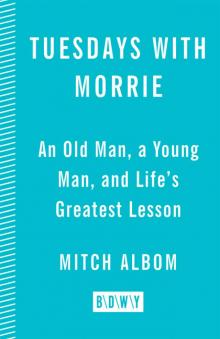 Tuesdays With Morrie
Tuesdays With Morrie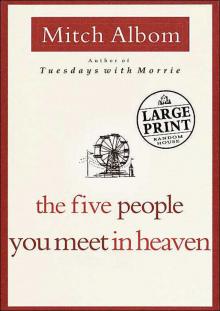 The Five People You Meet in Heaven
The Five People You Meet in Heaven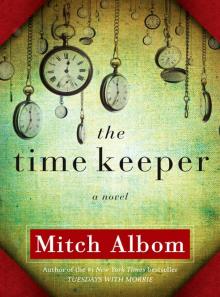 The Time Keeper
The Time Keeper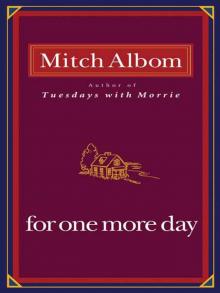 For One More Day
For One More Day The First Phone Call From Heaven: A Novel
The First Phone Call From Heaven: A Novel The Magic Strings of Frankie Presto
The Magic Strings of Frankie Presto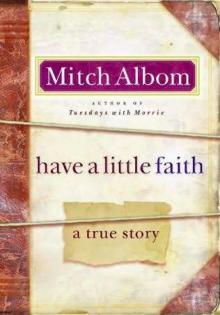 Have a Little Faith: A True Story
Have a Little Faith: A True Story The Next Person You Meet in Heaven
The Next Person You Meet in Heaven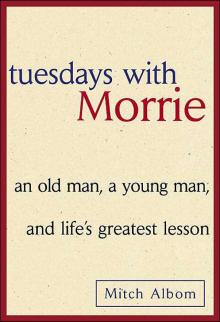 Tuesdays with Morrie: an old man, a young man, and life’s greatest lesson
Tuesdays with Morrie: an old man, a young man, and life’s greatest lesson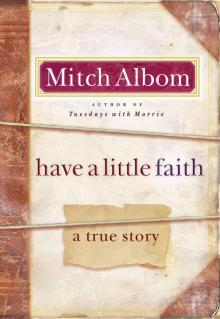 Have a Little Faith
Have a Little Faith